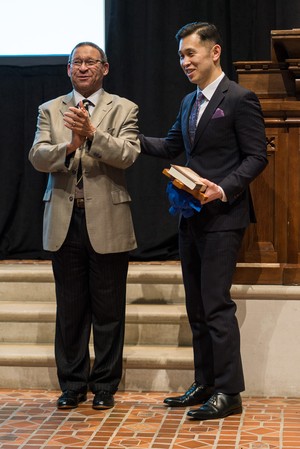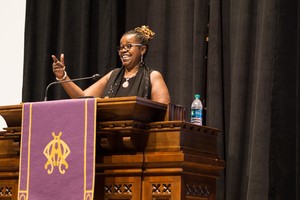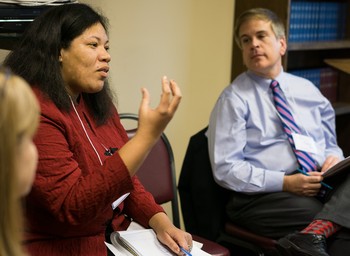Following morning worship, the first full day of the NEXT Church National Gathering continued with keynote presentations, testimonies and workshops aimed at giving Presbyterian Church (U.S.A.) leaders new skills and partnerships for ministry.
Atlanta urban development pioneer Bob Lupton spoke on the church’s urban engagement. The ministry he founded 40 years ago, Focused Community Strategies, has led the way in re-developing neighborhoods as justice-oriented, sustainable, mixed income and racially diverse communities. Having worked with local and national partners, including churches and faith-based groups, Lupton said the first step in beginning similar work is “recognizing dignity” in the people and in the community.
Seventeen afternoon workshops provided a broad range of topics for the nearly 600 attendees. Many sessions focused on leadership development and contextual ministry solutions. Others tackled topics such as the effectiveness of short-term missions and the church’s public relationships with communities and law enforcement, following a year punctuated by high profile acts of violence against African Americans.
A session titled “Leading Change: Epic Fails and Spirit Surprises” was led by Shavon Starling-Louis and Glen Bell, both Presbyterian teaching elders. Starling-Louis and Bell shared personal experiences of failure that led to new insight and growth. They extended their observations to institutional failure, noting the church has not historically dealt well with anything less than success.
“We’ve set up an expectation that we never fail in the church; we don’t talk about it. If we don’t recognize it, we overreact when it happens,” said Starling-Louis.
Tom Hay, director of operations and associate stated clerk for the PC(USA) Office of the General Assembly, agreed, saying, “Part of the gift you have as a leader is showing people how you respond when there is failure.”

Allan Boesak, South African theologian and pastor, following a round of ‘Happy Birthday’ sung after he presented at the NEXT Church national gathering in Atlanta, Feb. 22, 2016. —Gregg Brekke
Bell offered three guidelines he uses in establishing a failure-resilient organization, adding that the combination is intended not to avoid failing at initiatives, but rather to learn and respond to circumstances. While not a guarantee of success, he said choosing partners who can provide honest feedback and accountability, staying true to the vision, and being patient enough to see the long-term vision as a destination, helps leaders adapt and move on when plans don’t materialize.
Alison Harrington, pastor at Southside Presbyterian Church in Tucson, Ariz., spoke later in the afternoon on the New Sanctuary movement and Southside’s recent offer of sanctuary to two people with deportation notices. Southside was a leader in the original Sanctuary movement in the 1980s under the leadership of its pastor at the time, John Fife.
Calling special attention to the fate of families separated due to deportation, she wondered what other response the people of Southside could have offered other than sanctuary. “Do we turn away from injustice?” Harrington asked. “Or do we perceive the injustice and seek to make it right.”
Urging others to find justice motives from a basis of faith, she said, “Courage is fear that has said its prayers.”
South African theologian Allan Boesak delivered Monday’s final keynote. A frequent speaker at Presbyterian events, he reminded attendees that the Belhar Confession “has become our witness to and in the world.”
Boesak’s presentation centered on his assertion that reconciliation efforts rooted in faith must be “real, radical and revolutionary.” His broad-ranging talk covered the history of Apartheid in South Africa and warned of the cooption of the church’s prophetic voice by political systems. He lamented both police brutality in the U.S., especially against people of color, and the church’s relative silence. And he wondered “where is the outrage” over 12,000 lead-infected children in Flint, Mich., in comparison to terror attacks that have doomed far fewer people.
Noting the PC(USA) will vote on the adoption of the Belhar Confession at its 222nd General Assembly this summer, he said its radical ideas of reconciliation—if properly understood and enacted—were not for the faint of heart. “Be careful,” he cautioned. “Those who call upon the name of Jesus must know what we do."
The evening finished with a celebration of Boesak by Heath Rada, moderator of the 221st General Assembly (2014). Calling Boesak a “dear friend and mentor,” Rada presented gifts on behalf of the church and led the conference in singing “Happy Birthday” to Boesak, celebrating his 70th birthday.

Aisha Brooks-Lyle, minister of mission at Wayne Presbyterian Church in Philadelphia, preaches at the NEXT Church national gathering in Atlanta, Feb. 23, 2016. —Gregg Brekke
Tuesday morning’s worship featured the NEXT Conference Choir and a sermon by Aisha Brooks-Lytle on the story of the woman at the well from John 4. Brooks-Lytel began by referencing the children’s story “We’re Going on a Bear Hunt,” saying the common refrain of the story is that “You’ve got to go through it. Jesus went through it.”
“Jesus doesn’t shy away from difficult conversations,” she said, “he starts them.” Calling 2016 the “silver anniversary edition of racism and classism,” she urged attendees to strive to engage in diverse communities.
“Stay engaged in the difficult conversations of race and class,” she said. “To clergy and leaders: have some friends that don’t look like you, that don’t have the same experiences as you do. Even if that means going outside the denomination.”
The morning concluded with two “testimonies” and selected Ignite presentations. The first testimony was an interview with Elizabeth Kiss, president of Agnes Scott College, and Leanne Van Dyk, president and professor of theology at Columbia Theological Seminary, in which they discussed both the role of women in church and educational leadership and the continued work of fostering diversity in academic settings. The second testimony highlighted the work of Jessica Vazquez Torres, a leader with 15 years experience in antiracism, anti-oppression, and cultural competency workshop development and facilitation.
Four Ignite presentations—based on online video submissions—offered glimpses of innovative ministry across the PC(USA) and were delivered by Miriam Mauritzen, Michael Mair, Jeff Krehbiel and Don Meeks, and Lori Raible and George Anderson.
On- and off-site workshops continue through the day. The NEXT Church National Gathering concludes Wednesday afternoon with closing worship.
-----
NEXT Church describes itself as a purposeful relational community of Presbyterian leaders whose mission is to strengthen a vibrant and thriving PC(USA) that shares the good news of Jesus Christ in ways that matter to and have impact on God’s evolving world.

